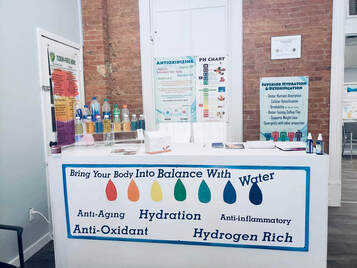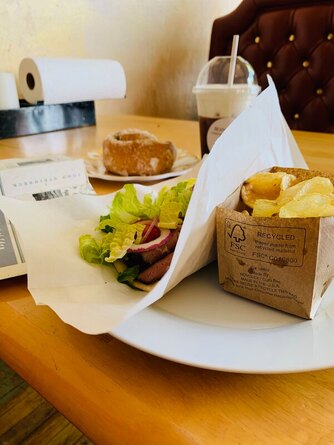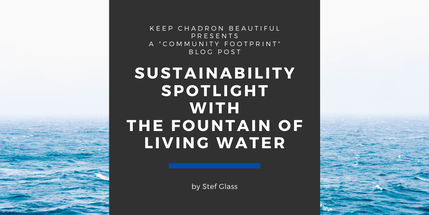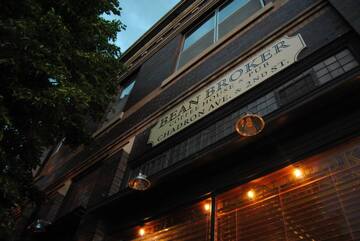 One of the forms of waste that is most notorious for contributing to pollution and litter is plastic. Particularly, plastic bottles. “Plastic bottles and bottle caps rank as the third and fourth most collected plastic trash items in the Ocean Conservancy’s annual September beach cleanups in more than 100 countries” (Parker, Laura). We have all seen the commercials publicizing the risk waste poses to our oceans, and the proper disposal of plastic waste continues to be a significant societal problem. However, more than properly disposing of plastic waste, we need to focus on reducing plastic waste. The reason this needs to be our primary concern is that it is extremely difficult, and at times impossible, to remove plastic from our oceans. According to an article published in Science Magazine in 2015 the “weathering of plastic debris causes fragmentation into particles that even small marine invertebrates may ingest. Its small size also renders this debris untraceable to its source and extremely difficult to remove from open ocean environments, suggesting that the most effective mitigation strategies must reduce inputs” (Jambeck). We also need to be aware that while plastic can be recycled into other products, this can only be done a few times before it must be downcycled instead. In contrast, glass can be recycled an infinite number of times. We need to be aware that once plastic has been recycled it’s maximum number of times, it is a very hard material to break down and, often, it is plastic waste that is damaging our oceans and ecosystems (Iamrenew.com). Local business owner, Shelly Thiry, wants to draw the attention of the Chadron community to the issue of plastic waste and reduction. Her business, the Fountain of Living Water, is new to our town. After operating out of her home for the past four years, Thiry opened her doors on March 10th, 2020 in the midst of the Covid-19 pandemic. However, when asked about how she feels about opening during this time, Thiry quoted Ester 4:14: “For such a time as this.” Thiry’s business supplies Chadron with another option for water refills. Thiry states, “The Fountain of Living Water is a place where people can come in to get healthy products and healthy water. I’m offering more than just tap water; more than just filtered water. I’m offering high alkaline antioxidant molecular hydration.” Thiry commented on the problem of plastics on an environmental level, stating: “We all know that plastic is a huge pollutant. It’s ridiculous. We are responsible. We are stewards of this world and we need to take good care of it.” Accordingly, while Thiry does offer refillable plastic bottles for her customers, she also sells glass jugs, and encourages their use over plastic. One product that Thiry sells is a high PH cleaning water, which allows for a reduction of both plastic waste, and helps to lower the amount of toxins the consumer is introducing both into their body and into the ground water itself, “Cleaning vegetables is one potential use for the water. You don’t have to use harsh chemicals. The high PH water can help to remove pesticides. We have an oil emulsifying water. A lot of the time vegetables, fruits, and nuts are coated with wax. This water is mixed with a tiny bit of salt water, and the high PH of the water helps remove 95-99% of pesticides and it cleans seeds, nuts, tomatoes, and it gives your produce a shot of hydrogen so that your produce lasts longer. So that helps with the environment and reducing food waste. With that water you can also replace your laundry soap.” Utilizing a high PH water in cleaning might be one of the simple swaps we can make toward a lifestyle which incorporates waste reduction. Thiry is deeply passionate about health and wellness, and wants to call for community awareness about the negative side effects of dehydration, and to increase our knowledge as to the benefits of drinking enough water, “I would like to see people drink more water, we’re chronically dehydrated. There are so many consequences from dehydration. We’re headed into summer. Just drink more water, then you feel better, you live better. You become healthy from the inside out.” Thiry is right, the effects of dehydration on the human body can range from inconvenient (bad breath) to catastrophic (seizures, brain swelling, death). What makes this particularly concerning is that, according to one survey of 1,000 working Americans, 80% of people believe that they are not drinking enough water (Quench). Thiry would like to encourage the Chadron community to work toward countering that statistic and the amount of plastic waste we are introducing into the environment. She welcomes members of our community into her business with open arms, stating: “Come in, fill your jugs!” Works Cited Parker, Laura. “How the Plastic Bottle went from Miracle Container to Hated Garbage.” https://www.nationalgeographic.com/environment/2019/08/plastic-bottles/#close Jambeck, Jenna, et al. “Plastic Waste Inputs from Land Into the Ocean.” Science. Vol. 347, issue 6223. Feb 13, 2015. 768-771. “Nearly 80% of Americans Say They Don’t Drink Enough Water: Quench Survey.” prnewswire.com. June 19, 2018. “Recycle Conundrum: How Many Times Can Recyclables Be Recycled?” Iamrenew.com. May 10, 2019.
0 Comments
As the newly appointed Education Coordinator for Keep Chadron Beautiful, I knew that I wanted to incorporate online instruction from community members about ecology and nature into our blog. One of the first people I reached out to, Dr. Mary Clai Jones, English Professor at Chadron State College, is known to both her friends and her students for her love of birdwatching. She brings just as much enthusiasm to her practice of birdwatching as she does to the classes she teaches. Please view her video, and the first of our educational series, above. You will need some colored pencils and paper to complete activities along with her.
Engaging in birdwatching offers numerous benefits. In addition to gaining a familiarity with local nature, birding serves as a form of meditation and encourages people to get outdoors and increase their activity levels. According to a recent study from the University of Exeter, birdwatching can actually reduce stress levels and improve mental and physical health: “Birds around the home, and nature in general, show great promise in preventative health care, making cities healthier, happier places to live” (Cox, Daniel). But birdwatching has the potential to go beyond the neighborhood, particularly with Chadron’s proximity to local hiking trails, Chadron State Park, and the Ogallala Grasslands. For some additional resources on birding in Nebraska: http://nebraskabirdingtrails.com/ https://www.audubon.org/news/birding-nebraska https://sites.google.com/view/chadron-summer-reading-program/kcb-themed-months?authuser=0&fbclid=IwAR2MzxrHCBYpz2CyVzoQQRSMd3NbPbJsUdyxStaJTZyjpIwUhRfm3ZNEUW0 Works Cited University of Exeter. "Watching birds near your home is good for your mental health: People living in neighborhoods with more birds, shrubs and trees are less likely to suffer from depression, anxiety and stress." ScienceDaily. ScienceDaily, 25 February 2017. "If we use a red onion in a recipe today, then we might pickle the left-over onion for something else tomorrow."  During my time studying English Literature at Chadron State College, I often found myself drawn to study in the comforting environment offered by The Bean Broker. I would sit in one of the comfortable chairs by the fire, drinking coffee and completing my readings for classes. The food is fresh and flavorful – often accented with the fresh herbs that the owners grow themselves in planters outside the iconic brick building. To quote recent graduate CSC alumni Alyssa Ermish, “I love the Bean Broker because of the relaxing communal space it provides. Some of my favorite memories and deepest conversations with friends have been over a cup of coffee there.” In addition to great coffee and delicious food, the Bean Broker offers Chadron a sense of community. They frequently host events such as open mic nights and support the performances of local musicians. As a customer, I was already aware that sustainability and waste reduction was a focus of their business, and eating at their establishment always felt like I was making a conscious choice to support a business that was mindful of ecologically friendly practices. But I was curious. I wanted to do some digging and find out additional information regarding the way the Bean Broker goes about achieving both their sustainability and community-related goals. I spoke with the manager, Alicia Felton, regarding the Bean Broker’s sustainable practices. One thing she emphasized throughout our talk, was the Bean Broker’s intent to feel open to everyone. “Our owners, Paige and David Feddersen, often say that they want the Bean Broker to feel open to everyone. Regardless of income, race, gender—we want this space to feel like your living room. We want you to feel at home here.” Felton also offered a great deal of insight into the efforts that they have made to create a sustainable business within our community: “One of the big things we’ve tried to do is cut down on plastic as much as possible. If people are interested in using a paper sack or a wax paper wrap over a plastic container, we make those available. Trying to use paper to-go containers—really any kind of paper products versus plastic containers for to-go items. We try of course, to implement paper straws. Early on, paper straws were both hard to come by and expensive. As time has gone on and paper straws have become more popular that has become more affordable. I also think that the Bean Broker does a great job as far at limiting the amount of food waste. For instance, if we use a red onion in a recipe today, then we might pickle the left-over onion for something else tomorrow. In the past, we donated food that was almost out of date to the masonic temple for the lunches they hold there. We aren’t able to do that as much anymore, just because we don’t have as much food waste as we used to.” Felton noted that their choice to implement a box garden for their herbs was a choice that allowed them to reduce plastic waste and promote fresh ingredients, which is directly connected to their environmental mission statement, “We have our own gardens out here, of course we wish they were a lot bigger. But we’re trying to utilize our own gardens to grow herbs for food and cocktails.” In addition to gardening themselves, the Bean Broker also serves as an excellent resource for local gardeners. According to Ann Marie Hendry of Growveg.com, utilizing coffee grounds as fertilizer is the right choice: “it turns out that coffee grounds contain a good amount of the essential nutrient nitrogen as well as some potassium and phosphorus, plus other micronutrients. The quantity and proportions of these nutrients varies, but coffee grounds can be used as a slow-release fertilizer.” In an effort to give back to Chadron and to reduce waste, the Bean Broker offers their leftover grounds to the community. Felton stated, “Many people come in to pick up coffee grounds for their gardens, and that’s something we offer for free to pick up. They are something we almost always have some of on hand – if not a full five-gallon bucket.” Many restaurants had to confront issues with additional food waste and sustainability during the onset of Covid-19 and the subsequent business closures. The Bean Broker was no exception. “Initially when that hit Nebraska, we were full of food, but we couldn’t utilize that food. It definitely impacted us in those first few weeks as far as the food that we had. We needed to find different ways to use it so that we could sell it to make sure we didn’t waste things there. One thing that was hard for the Bean Broker, was that we couldn’t take our fabric bags to the store. We buy a lot of things and when you have to come back with so many plastic sacks that’s detrimental for the environment.” However, during the closure, the Bean Broker also found that they were able to limit their menu in a way that reduced the amount of food waste they produced during the unusual circumstances caused by Covid-19. Felton and I discussed the Bean Broker’s decision to commit to more sustainable practice and she noted that, while their environmental business statement asserts that they are “committed to a role of environmental leadership and stewardship in every facet of our business” they had also made changes to the Bean Broker’s operation “primarily because Chadron consumers want it.” She spoke to the nature of the Chadron community’s dedication to purchasing from Earth friendly businesses, “It makes our business more approachable because the consumer recognizes that you’re considering those things. It’s not always financially the better way to go. Like I said, paper straws are getting cheaper but plastic straws are 10th of the cost. Financially, it takes more money from us. But we benefit by getting more of the consumer in because of it.” In this way, Felton’s comment draws attention to the fact that community members can create change by purchasing from businesses that support sustainability. Works Cited Hendry, Ann Marie. “A Common-Sense Guide to Using Coffee Grounds in the Garden.” https://www.growveg.com/guides/a-common-sense-guide-to-using-coffee-grounds-in-the-garden/. (2017). We offer a sincere thank you to the Bean Broker for their time and contribution to our site. |
AuthorStef Glass is the Education Coordinator for Keep Chadron Beautiful. She graduated from Chadron State College with her BA in English Literature and minors in History and Creative Writing in May of 2018. Archives
June 2022
Categories |
Proudly powered by Weebly



 RSS Feed
RSS Feed